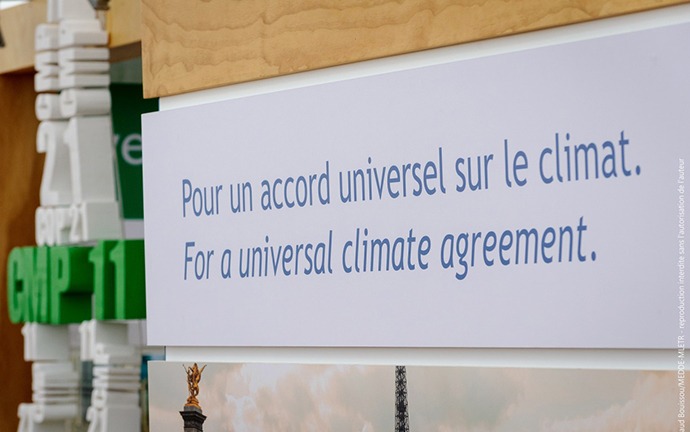By Heather Coleman, Oxfam America

Global climate negotiations begin in France on Sunday. Photo: http://bit.ly/1T4UMN8
A few top-line comments on the agreement coming out of COP21
We have been waiting for the world to act and today, more than 190 countries — including the US, have come together to do just that. Having been part of the climate movement for most of my professional life, it will be a moment I will not forget. It’s hard to overstate how important and historic a moment this is, with the US at the center of a global agreement that addresses one of the greatest challenges of our time.
In the coming days, we at Oxfam will dive into the details and analyze what the text does and doesn’t say. But here are a few of my top-line comments on where we ended up and what it means for our collective future:
Mitigation
- Even a few months ago no one predicted how much traction the group of vulnerable countries would get on the goal of reaching beyond the 2°C temperature goal to a 1.5°C target. For small island nations the .5°C difference between the two means life or death for their people. The deal sets 1.5°C as a stretch goal and while we are far from even reaching the 2° based on current commitments, I believe we have set in place an architecture that will give us a fighting chance.
- All countries are on the hook for setting emissions reduction commitments into the future based on five year cycles and to increase the ambition of those commitments over time. What this means, for example, is that the US would come to the table before 2020 to update our goal for the year 2025. Before 2025 we would also be expected to put our target forward for 2030. Other countries have slightly different timing based on their own contexts – what this agreement does is move all countries toward five year cycles. But overall we need to push for stronger ambition outside of the Paris Outcome in the coming year.
- There’s language in the agreement that establishes what’s called a “long-term goal” to zero out greenhouse gas emissions by the second half of the century. This is an important signal that we are shifting away from a fossil fuel driven economy and represents a win over entrenched interests. My take is what matters is that we shift to 100% renewable energy as quickly as possible and that we quickly adopt domestic policies, like shifting fossil fuel subsidies, that help us get there.
- The Paris agreement also asks the US to communicate a longer term strategy on how we will reduce our GHG emissions by 2050 to help achieve the long-term goal. This forward looking strategy will help us think through the things the U.S. will need to do to shift to 100% renewable energy over the longer term.
Finance
Oxfam has been leading the climate finance fight for about a decade, and it’s the issue that is crucial for the poorest among us who are on the frontlines of climate change. Unfortunately, this deal doesn’t get us enough ambition to achieve 2°C, nevermind 1.5°C. Bust we did get some wins here in Paris on finance. Here’s how it shakes out:
- Before coming to Paris many countries doubled down on their climate finance commitments and the U.S. announced here a doubling of their grant-based, public finance for adaptation by 2020. This sent an important signal to the world and it will be important that Oxfam works in the US to make sure we follow-through on this commitment.
- One of the key points of tension in the negotiations was whether developing countries with capacity, will also need step up with finance into the future and there is language there encouraging them (but not obligating them) to do so.
- Developed countries have agreed to continue their commitment to mobilize $100 billion and parties will set a new finance target by 2025 to scale up finance from the $100 billion floor. This sends a signal that they will continue to mobilize climate finance to help speed up the transition towards low-emission, climate resilient economies, but stops short of ensuring vulnerable communities will get the support they need to adapt to the effects of climate change long into the future.
- For years Oxfam has been drawing attention to the persistent underfunding of adaptation. In Paris, Parties agreed to work towards better balance, but didn’t take a decisive step and agree on a specific target for adaptation finance. We’ll need to keep pushing hard to make sure support for adaptation doesn’t get the short end of the stick.
- There’s also good language in there linking support for adaptation to the level of mitigation ambition, which is important because the closer we get to a 3°C future (or beyond, God forbid) the greater the needs to build resilience and response capacity will be.
The Paris agreement represents an important milestone in the fight against climate change, but the battle doesn’t stop here. I knew coming into Paris we would only be part way to 2°C, but the Paris agreement does deliver the basic ingredients to keep that goal in sight. We will have to continue pushing and fighting, using our voice to building on the momentum from Paris. And we’ll need all of you – businesses, civil society and individuals to keep the pressure on our leaders to translate this historic agreement into the future our children and grandchildren need and to ensure that communities on the frontlines aren’t left to shoulder the impacts of climate change on their own.
But for now, I’m taking a moment to appreciate how far we have come and acknowledge the hard work it took to bring all parties to the table in a universal agreement. And toast to our planet!